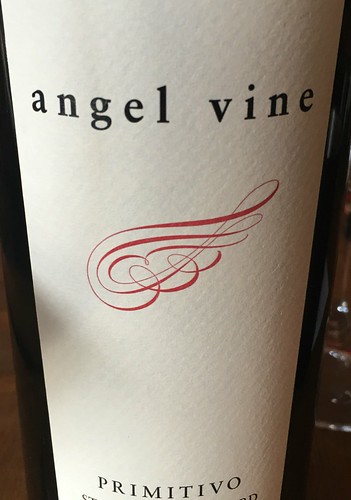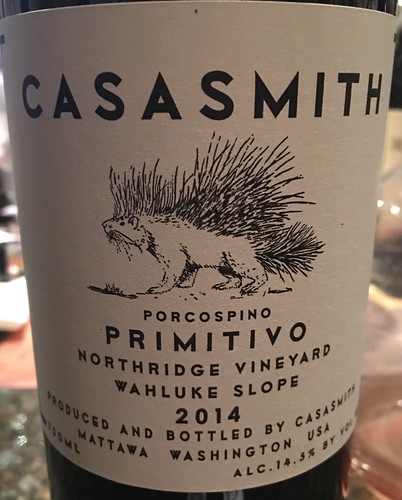An interesting fact about Primitivo is that it is related to Zinfandel. Some DNA tests show that the grapes are the same, some tests say they are different. One thing is certain - you will mostly find Zinfandel in California and Primitivo in Italy.
For this challenge I had a hard time locating a challenger from Italy. What to do? What about an intrastate match? Washington v. Washington with a twist - Washington Winemaker v. Oregon Winemaker, both using Primitivo grown in Washington. Game on!
2014 Casa Smith Porcospino Primitivo v. 2011 Angel Vine Columbia Valley Primitivo.
Tale of the Tape
2014 Casa Smith Porcospino Primitivo
100% Primitivo from the Northridge Vineyard located in the Wahluke Slope AVA
100% whole cluster fermentation
Aged for 12 months in 35% new French Oak Barrels
Provided as a sample by the winery. Available at retail for $20/bottle.
 2011 Angel Vine Columbia Valley Primitivo
2011 Angel Vine Columbia Valley Primitivo 100% Primitivo from the Stone Tree Vinyeard in the Wahluke Slope AVA
Aged for 10 months in a mix of neutral French and Hungarian Oak Barrels
Provided as a sample by the winery. Available at retail for $20/bottle.
Round 1. First opening
Casa Smith saunters into the ring looking bold and confident. The nose is dark with notes of plum, earthy spices and a tinge of anise. The palate re-affirms the dark nature of this Washington State Luchador with notes of plum, tart dry leather and light cocoa powder.
The Angel Vine challenger from Oregon, by way of Washington, counters with agility and speed. The nose shows red berries intermingled with earthiness. The palate repeats the earthy character with luscious red berries, hints of forest floor and earthy mineral notes.
Even though these Luchadors both come from the same neighborhood, they are flaunting very different styles. Casa Smith takes round one with a more aggressive attacking style.
Round 2. One hour later
Angel Vine continues to bob and weave and stick and move looking for a chance to attack. The nose is evolving with more earthy character backed by similar red berry notes that are deepening slightly. The palate is following suit with darker red berries and more earthy spices.
Look out below! An over confident Casa Smith charges headlong into an unexpected Angel Vine headlock. Even the power profile that features a nose of dark plum, cocoa powder, licorice and candle wax along with a palate showing dark plum, tart cocoa, subtle tobacco leaf and a bit of dry cocoa on finish is no match for the Angel Vine.
Angel Vine takes round two and evens the match.
Round 3. One day later
With the match all tied at one, both corners are looking tense. Who is going to be the aggressor in this final round?
It looks like Casa Smith is going for the gusto! This Luchador has found some hidden source of strength. The nose is showing dark plum, currants and dusty baking spices. The palate is also showing notes of dark plum, currants, and baking spice along with some notes of cocoa powder and fine tannin spices on the finish.
The Angel Vine challenger isn't backing down. The nose is continuing to build momentum with notes of medium red berries, forest floor, mushrooms and earthy minerality. The palate is bringing medium red berries, hints of menthol, light earthy spices and good tannin on finish.
Casa Smith laid it all on the line and left an opening that Angel Vine took advantage of by locking up the Casa Smith Porcospino in a figure four leg lock submission hold. Casa Smith taps out and Angel Vine takes the final round and the match!
Wrap up and overall observations
Both of these Primitivos really gained strength and character over the match. They both continued to evolve and develop solid character for a couple more days.
They definitely showed different characteristics with the Angel Vine featuring a medium body and more earthy characteristics. The Casa Smith was darker and bolder. The difference is most likely the result of the vintages. 2011 was much cooler than 2014.
Both of these wines are great values at $20 a bottle. Seek them out at your local wine shop. You will be pleased with the results.


No comments:
Post a Comment